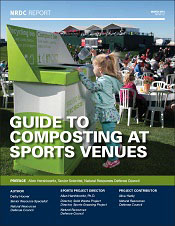Composting may not be the first thing that comes to mind when you think about eating at a ball game, but the Natural Resources Defense Council (NRDC) is working to change that. This week, the environmental group has published the Guide to Composting at Sports Venues, a free resource for stadiums that want to reduce and manage their food waste more effectively.
 Many sports stadiums are already working hard to deal with food waste in a responsible manner, and they’re paving the way for sustainable practices to one day become de riguer at every stadium in the country. The guide includes case studies of successful stadium food waste efforts and provides a step-by-step plan of action for stadiums to follow, starting with performing a waste audit and finding a hauler to educating staff and involving fans.
Many sports stadiums are already working hard to deal with food waste in a responsible manner, and they’re paving the way for sustainable practices to one day become de riguer at every stadium in the country. The guide includes case studies of successful stadium food waste efforts and provides a step-by-step plan of action for stadiums to follow, starting with performing a waste audit and finding a hauler to educating staff and involving fans.
A resource like this is especially helpful because a food waste program doesn’t have a one-size-fits-all solution — if there’s no composting facility nearby that can handle the capactiy, anerobic digestion might be the answer, or vice versa. The NRDC’s guide lays out the options so stadium operators can find the best path for their location and situation.
But why is the NRDC focusing on sports venues in the first place? Here are three great reasons:
1. Direct Environmental Impact: Of the 72 billion pounds of food waste produced each year in the United States, less than 5 percent of it is recovered for composting, according to the guide. Instead much of it decomposes in landfills emitting methane, a greenhouse gas 34 times more potent than CO2. Composting reduces this waste and lessens the need for landfills or incinerators.
Winning Example: The US Open — The composting programs at the 2011 and 2012 US Opens collected organic waste from kitchens as well as fan waste from the eateries in and around Arthur Ashe Stadium. During those two events, the U.S. Tennis Association collected 243 tons of organic waste, which was turned into compost for landscape and farming uses. In 2013, the compost initiative also collected more than 12,000 gallons of cooking grease to be converted into biodiesel fuel.
2. Fan Awareness and Education: Publicizing environmental achievements sends the message to fans and others that being a responsible environmental steward is an important part of how a stadium does business. Ideally, fans will come to expect recycling and compost bins at their local sports venues and other places they go for entertainment.
Winning Example: Seattle Mariners — The Seattle Mariners engage fans through the BASF Kid Compost Trivia Game, which asks fans to text a response to an environmentally themed question at the end of the first inning. After the seventh inning, one fan who has texted in the correct answer is awarded a prize.
3. Supply Chain Impact: When sports organizations adopt greener practices, that sends a powerful message up the supply chain and to sponsors that greener products and services are a priority—and this means that those greener products and services might become more available to other customers too.
Winning Example: Philadelphia Eagles — After changing cutlery, plates, napkins, and cups to compostable products, the Philadelphia Eagles struggled to find a compostable wrapper for their hot sandwiches. In partnership with their concessionaire, ARAMARK, they continued to ask for the product they needed and at the end of 2011 were finally able to find a compostable sandwich wrapper that met their quality standards.
We’re proud to be a sponsor and collaborator of this guide. If you want to reach the heart of America, there’s no better way than through sports. Sports entertain, unify and inspire millions of Americans of all ages and backgrounds every year.
If you’re a fan of sustainability, check out what your favorite local team is doing in this area, and let them know you’d like to see them develop a food waste plan. With this new guide, that job just got a little easier. To learn more, check out the waste and composting strategies in the NRDC Greening Advisor and in NRDC’s Game Changer and Collegiate Game Changers reports. Learn more about the NRDC Sports Project at nrdc.org/sports.
Amy Leibrock
Sustainable America Blog Editor
